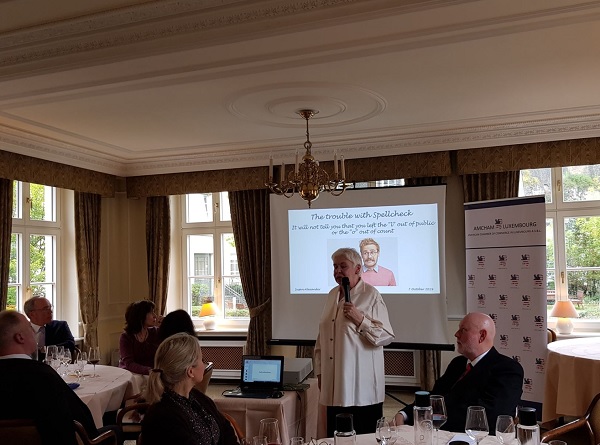 Susan Alexander;
Credit: Jazmin Campbell
Susan Alexander;
Credit: Jazmin Campbell
The American Chamber of Commerce in Luxembourg (AMCHAM) held a lunch event this afternoon on authoring and publishing, with guest speaker Susan Alexander, at Cercle Munster.
A native New Yorker who has lived in Luxembourg for many years, Susan Alexander has authored seventeen books, as well as short stories, magazine articles and research reports. Her diverse career has seen Susan work as a professional musician, an ordained Protestant clergywoman, a Vice President on Wall Street and the founder of her own independent research firm.
Following lunch and an introduction by AMCHAM chairman and CEO, Paul Schonenberg, Susan gave a presentation entitled “So you want to write a book”. The presentation focused on the many steps and aspects of the writing and publishing process, including lots of practice and reading, note taking and knowing your audience. Susan also emphasised the importance of choosing a genre and building on one's own knowledge and expertise.
Once a prospective author has an idea for his/her plot, it is time to engage in lots of research, both online and using one’s own resources. In this context, Susan suggested using the National Library’s (BnL) many resources. After that, perseverance is key, as is having the right tools (a good, portable laptop, Microsoft Word, Photoshop for book covers, a Kindle, notebooks and backup) and the right support measures (caffeine, alcohol, pets for company).
Returning to the matter of choosing a genre, Susan highlighted the main difference (and similarities) between works of fiction and non-fiction. She emphasised that “the best non-fiction reads like a novel”. Susan added that non-fiction has its own range of genres and target audiences, and so thorough research and referencing is required. She similarly recalled the dangers of plagiarism.
Once the book has been written, Susan emphasised the importance of finding a good title and cover, choosing a readable font and format, thorough proofreading and investing in a good reference book for spelling, grammar and punctuation.
The next decision is to find a publisher (mediated) or to self-publish. Personally, Susan prefers the latter as it allows the author to retain more control over their book and royalties. In this regard, she recommended publishing through Amazon (Kindle Direct Publishing), which offers “control, transparency, support, global reach and the best how-to documentation ever”. Nevertheless, Susan quirked that unless an author is the next bestseller, “don’t quit your day job”.
Susan then discussed ways of getting people to read your book after publishing. She suggested joining writers’ groups, such as Luxwriters, special interest groups related to the book topic or booking a meeting room for book readings or a related event, as well as joining book clubs, exhibiting at book fairs, visiting literary cafés (Le Bovary in Luxembourg-ville) and participating in literary competitions and events. One such competition in Luxembourg is the CNL prize, where the genre varies from year to year. Another option is to submit the book to a literary reviewer although this could have either positive or negative consequences. In addition, Susan recommended setting up a website (WordPress) and social media page(s), along with an author page on Amazon.
Susan Alexander concluded by reminding AMCHAM’s guests that “everyone has a story to tell”, a sentiment with which Paul Schonenberg agreed in his concluding remarks. The event also included a Q&A session during which guests asked about dealing with criticism, the processes of planning and writing a book and confronting writer’s block. Susan replied that ignoring criticism is an option, unless it is coming from someone you trust, that the process varies from individual, and that, in the case of writer’s block, one should either take a break and focus on other things or just force themselves to sit down and write something.








